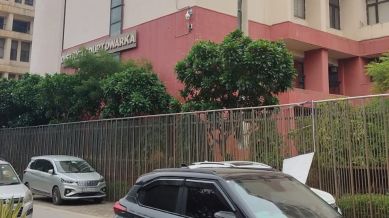Stay updated with the latest - Click here to follow us on Instagram
Over 15 L cases pending in Delhi’s lower courts, 31% related to cheque bounce claims
The Indian Express visited various digital courts across the Capital that exclusively hear such cases

At 4.54 lakh, three in ten cases (around 31%) pending before Delhi’s lower courts are related to cheque bounce claims.
The Indian Express visited various digital courts across the Capital that exclusively hear such cases. On average, Digital NI Act (Negotiable Instruments Act) Courts, which deal with these cases, hold 100 hearings every day, according to publicly available cause lists.
Section 143(3) of the NI Act states, “Every trial under this section shall be conducted as expeditiously as possible and an endeavour shall be made to conclude the trial within six months from the date of filing of the complaint.”
However, due to a large pendency, two consecutive hearings take place at a gap of 10 months, and in several instances, even a year.
These cheque bounce cases are among the 15.18 lakh cases pending before the Capital’s lower courts — 13 lakh criminal and 2.18 lakh civil.
The 12 trial courts in the city have a total of 672 judges. Every day, close to 24,000 cases are heard in these courts, with each judge deciding the fate of 35 cases on average.
While some courtrooms may be burdened with as many as 200 cases a day, others might be hearing just one or two. If a judge decides to devote equal time to every case, they can spend less than 10 minutes on each. Of the 12 court complexes in Delhi, The Indian Express went through detailed statistical reports of 11 (collated data for Rouse Avenue Court was not available) courts.
Of the 11 statistical reports, seven were up to date (till February 2025), and the other four were six to ten months old. Here are the key findings:
- Close to 1.48 lakh cases (10%) are pending before Digital Traffic Courts. These cases mostly pertain to the settling of challans.
- Matrimonial cases, including divorce, maintenance, and guardianship, among others, account for 3.5% (52,000) of all pending cases.
- Approximately 23,000 cases (1.5% of total) are pending before the Motor Accident Claims Tribunals (MACT Courts), which deal with cases related to the loss of life or property and injuries resulting from motor accidents.
- Cases registered under the Domestic Violence Act account for 25,021 pending cases
- Pending cases of rape and murder (including culpable homicide) accounted for less than 1%. While 5,199 cases of rape are pending before Delhi’s lower courts, the number for murder (and culpable homicide) is 3,988.
- Cases pending under the POCSO (Protection of Children from Sexual Offences) Act stood at 9,682. Most of these are being heard by Fast Track Special Courts (FTSCs). Delhi’s 16 FTSCs recorded a disposal rate of 4.2%, 11%, and 17% in 2021, 2022, and 2023, respectively, showing an upward trend. As of January 1, 2025, the cumulative disposal of the 11 exclusive POCSO FTSCs in Delhi stood at 1,660.
- A total of 17,485 cases are pending in Delhi’s courts under the Arms Act (which deals with cases about the acquisition, possession, sale, import, export, and manufacture of arms and ammunition).
- Under the Narcotic Drugs and Psychotropic Substances Act (NDPS Act), 3,776 cases are pending.
In Central Delhi’s Rouse Avenue Court, 125 cases are pending against former and sitting MPs and MLAs. A third of these are pending as they are awaiting directions from higher courts (Supreme Court or Delhi High Court).